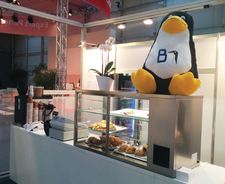Doghouse – Happy Anniversary
Many Happy Returns

"maddog" remembers 20 years of association with Linux, CeBIT, and open source.
I am writing this on the floor of CeBIT, the world's largest computer and telephony trade show. I am sitting in the booth of Medialinx, the parent company of Linux Magazine and various other "open source" magazines. I see from their posters that this year is the 20th anniversary of their flagship publication Linux Magazine, and I realize it is also the 20th anniversary of my involvement with the Linux project, because I met Linus Torvalds in May 1994.
I remember the first time I came to CeBIT. In those days, there was a waiting list to get floor space at the CeBIT show, and "first year" companies did not have a chance for even the smallest booth on the show floor. Linux International had a small booth in a "USA" pavilion, and except for the SUSE booth in another hall, we were the only visible "Linux" booth. The booth was shared by a fledgling Red Hat Software (represented by Bob Young), Caldera Software (represented by Ransom Love), and myself. We were handing out free CDs of Red Hat, Caldera, and (after they brought the CDs over) SUSE to anyone who asked for them.
During the first year I was at CeBIT, two other companies also carried the Linux flag, however. One was SAP, the largest software company in Germany, who liked GNU/Linux as a platform, and the other was an Israeli company called "Magic Software."
[...]
Buy this article as PDF
(incl. VAT)
Buy Linux Magazine
Subscribe to our Linux Newsletters
Find Linux and Open Source Jobs
Subscribe to our ADMIN Newsletters
Support Our Work
Linux Magazine content is made possible with support from readers like you. Please consider contributing when you’ve found an article to be beneficial.

News
-
The Next Linux Kernel Turns 7.0
Linus Torvalds has announced that after Linux kernel 6.19, we'll finally reach the 7.0 iteration stage.
-
Linux From Scratch Drops SysVinit Support
LFS will no longer support SysVinit.
-
LibreOffice 26.2 Now Available
With new features, improvements, and bug fixes, LibreOffice 26.2 delivers a modern, polished office suite without compromise.
-
Linux Kernel Project Releases Project Continuity Document
What happens to Linux when there's no Linus? It's a question many of us have asked over the years, and it seems it's also on the minds of the Linux kernel project.
-
Mecha Systems Introduces Linux Handheld
Mecha Systems has revealed its Mecha Comet, a new handheld computer powered by – you guessed it – Linux.
-
MX Linux 25.1 Features Dual Init System ISO
The latest release of MX Linux caters to lovers of two different init systems and even offers instructions on how to transition.
-
Photoshop on Linux?
A developer has patched Wine so that it'll run specific versions of Photoshop that depend on Adobe Creative Cloud.
-
Linux Mint 22.3 Now Available with New Tools
Linux Mint 22.3 has been released with a pair of new tools for system admins and some pretty cool new features.
-
New Linux Malware Targets Cloud-Based Linux Installations
VoidLink, a new Linux malware, should be of real concern because of its stealth and customization.
-
Say Goodbye to Middle-Mouse Paste
Both Gnome and Firefox have proposed getting rid of a long-time favorite Linux feature.
